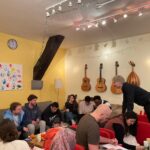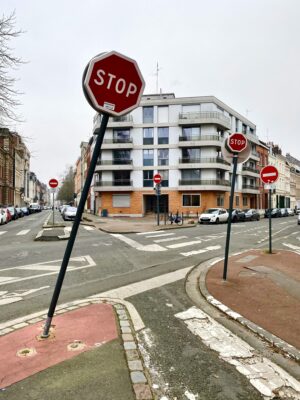


The most common public perception of refugees, often shaped by media narratives and rooted in stereotypes, portrays them as a homogenous group of impoverished individuals from foreign cultures, struggling to adapt to life in the Western world. Their vulnerability, need for asylum, and reliance on social or financial support frequently reinforce the assumption that they are troubled or dependent individuals.
Indeed, many refugees haven’t had the chance to complete their education, and years spent in transit often rob them of opportunities for personal growth, hobbies, or professional development. For individuals in the Global North, especially those with stable lives and educational privilege, it takes a great deal of empathy and emotional intelligence to truly understand the reality of someone facing such challenges.
But today, I want to share a different story – a story that shatters these stereotypes. A story of resilience, ambition, and quiet brilliance. One that reminds us that refugees are not defined by what they lack, but by what they overcome.
The man I met during my research for a local integration project is, in every way, a reflection of the lives we often take for granted. A.K.A is born in Sudan, he grew up in the embrace of family, charting a course that many would recognize: graduate from high school, pursue higher education, build a career, raise a family. And that’s exactly what he did. He earned his Bachelor’s degree in Pharmacy in 2010, and not long after, became the youngest regional manager of a multi-billion-dollar pharmaceutical company in his region—an extraordinary achievement grounded in diligence and quiet ambition.
He traveled to Europe more than once for business – on a plane, with a passport, as he later joked, “not by boat in the sea.” He never imagined staying. His home was Sudan; his future, until then, had always pointed back to it.
But life is not a story we write alone. He was born in the wrong country, one where the future was swallowed by conflict. War arrived not as a singular moment, but as a slow unravelling. What once was stable became dangerous. What once was home became haunted. And so, he did what anyone would do when the world collapses around them – he fled. He boarded a plane not as a businessman this time, but as a man in search of safety. Asylum was not a dream. It was a necessity.
His journey began across a series of refugee camps, each one a temporary stop in the long search for safety and stability. With his children beside him, he navigated the unfamiliar, trying to shield them from the confusion and fear that came with every new place. One of the camps in the Netherlands stood unsettlingly close to a military base, where the sound of gunfire from training drills echoed daily. For his children, each shot felt like a cruel reminder – war had not ended, it had simply changed location. They covered their ears in fear, unsure whether they had truly escaped.
Still, he pressed on. Through persistence, he managed to relocate to a more family-friendly camp in Maastricht. Two years later, he remains in limbo, still waiting for a decision that will determine whether this place can become home. That is where I met him, and where he chose to share his story.
Unlike many who choose to wait for their status before learning Dutch – frustrated by the system and often resigned to using only English – this man took a different path. Determined to adapt and belong, he explored every possible way to learn the language. As an asylum seeker, he has no access to government-funded language courses, yet when I asked him how he was learning Dutch, he reached into his backpack and pulled out a secondhand book titled “Learn Dutch in 3 Months.” He found it in a thrift shop for just one euro. By the day we met, he had already reached page 120 out of 200, eager to keep going.
Though he holds a university degree and years of professional experience, the Dutch system does not recognize his qualifications. Still, instead of resentment, he responds with understanding, aware of the cultural and institutional differences, and committed to starting over. He keeps moving forward, not only for himself but for the future of his family.
After navigating layers of bureaucracy and receiving his BSN number six months later than he should have, he finally found a job related to his background – a cleaning position at a nearby pharmacy center. I couldn’t help but pause and ask myself: Who among us in the West would accept such a shift in careers without protest? With a degree in Migration Studies, I found myself reflecting: under what circumstances would I be willing, or even able, to accept a job far outside my field, simply to stay afloat in a new country? For him, though, it was a glimmer of hope.
But hope is fragile in the face of slow-moving systems. The TWV work permit process dragged on, and local municipal policies only added to the delay. Despite the employer’s willingness to wait, the red tape made the job impossible to start. “It’s not the fault of the employers,” he told me. “It’s the system that is failing us.”
Inside the walls of Maastricht’s asylum center live people who once lectured in universities, ran labs, practiced medicine, or published research. Among them is this 38-year-old man with a strong and unwavering determination – a man willing to return to square one if it means reclaiming a future. “I’m willing to repeat everything just to start again,” he tells me, speaking not with bitterness, but with clarity. He has walked the halls of Maastricht University during open days, thinking that maybe one day he will be part of it. His age, his status, his temporary label – all of them act as silent gatekeepers. Some programs close the door at 35. Others require Dutch fluency that asylum seekers, cut off from formal education pathways, are rarely able to attain. Still, he shows up. Still, he asks. “If the gemeente and Maastricht University could create something like Radboud University in Nijmegen,” he says, “that would be very nice.” There, in Nijmegen, refugees are given a path to crash courses, academic bridges, and chances to pick up where war and exile interrupted them. “Here, there are at least 50 people who would take that chance if it were given.”
They don’t need charity, they need a second door. And someone willing to unlock it.
This brings me back to the deeply politicized nature of migration today. There are thousands of people in the Netherlands – people already here – who are ready and willing to work. Not just to support themselves, but to integrate, to contribute, to rebuild a life with dignity. And yet, the system wraps them in red tape. The very mechanism that should facilitate integration instead becomes a barrier. But isn’t this what a capitalist country needs – a motivated workforce to help drive its economy forward?
Ironically, the same rhetoric often used by right-wing politicians to criticize refugees – that they are a burden, living off taxpayer money – could be neutralized if only access to the labor market were granted. Why is that door still closed? Why do we create policies that punish the people who are already here, who want nothing more than to build a future?
The answer is uncomfortable but clear: these policies are not designed to manage the people who’ve arrived , they’re meant to deter those who haven’t. It’s not about fairness or efficiency. It’s about optics and fear. But surely there is another way. Surely we can imagine a system that deters irregular migration without denying rights to those already on our doorstep. Because at what point did migration stop being a human story, and start being a political weapon?
This article was written by Kristina Ivancheva and edited by John Shotton. Photo by CrowN on Unsplash